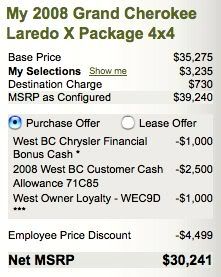nickw
Adventurer
I know that the 60 series has a mystique and a dedicated fan base. But let me present the bean counter's viewpoint about this conversion.
First, find a decent 60 from Arizona, a 25-30 year old vehicle, maybe 150,000 miles. Buy it for $2500. Now buy the diesel engine kit for $16K. Pay someone $3K to install. Total $21,500, plus the expenses associated with refurbishing a 25 year old vehicle (tires, brakes, transmission service, birfield rebuild, seat covers, maybe re-paint). Total will be close to $25K, maybe more.
Down at your friendly neighborhood Jeep dealer, you can purchase a brand new Grand Cherokee Laredo with Mercedes 3.0L V6 diesel (375 lb-ft of torque, EPA 25 mpg highway) for $31,200 (less if you already own a Jeep).

This price was effective Jan 28th, it may have changed. You may be able to negotiate a better deal. There are lots of dealers with 2008 diesel Grand Cherokees for sale. Check www.autotrader.com to find a dealer in your area.
For $6,200 more than the 60 series, you're buying a new vehicle with a warranty and dealer support. You're buying a vehicle that can be 100% financed, at a very low interest rate. In the current financial climate, I think financing the diesel conversion of the 60 would be a tough sell to your banker. And if you want to build the Grand Cherokee for more capable off-road performance, Jeep has tremendous support from aftermarket suppliers.
One more point: The Grand Cherokee meets 2008 emissions rules. The International diesel used in the 60 conversion is a modern engine, but it won't run as clean unless you pay for a particulate trap and catalytic converter. The Jeep will have no problem getting a license plate. The 60 series may have problems in states that are fussy about emissions.
I know that for a few people, having a classic 60 series with diesel engine is a dream, and the pride of ownership will make it worth the expense, and the hassle of finding parts and someone who can repair the unusual engine.
For most other people, the diesel Jeep would be a better choice.
Chip Haven
Looking at it from a life cycling costing standpoint - the cruiser is a much better value.
But you are right, no financing is a big deal and a hefty chunk of change.
